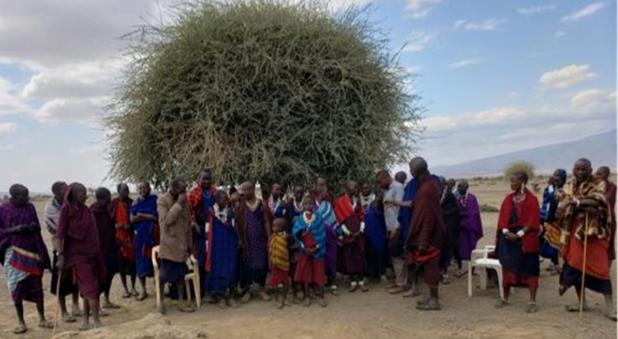“In one of our newly planted churches, our mission team baptised 680 adults in a day,” said Bishop Stanley Hotay of Mount Kilimanjaro Diocese in Tanzania. “You should come on one of our missions. You’ll be amazed and you could help with baptising. It gets tiring with so many!”
I had just touched down at Mt Kilimanjaro Airport and Bishop Hotay was giving me an update about his diocese.
Between 2019 and 2021, their teams had reached 2232 households with the gospel, with 12,855 people giving their lives to Jesus, 3501 baptised and 402 churches planted. They had also given food aid to 3000 poor families.
He reported that before he was elected bishop, the diocese had neglected reaching the tribal peoples in the remote parts of his diocese, so they started sending mission teams. “We found many groups who had never even heard about God or Jesus. So we went and preached the gospel to them”.
I have recently returned from meeting with 23 Anglican bishops and a dozen Bible college principals across DR Congo, South Sudan and Tanzania. As we travelled from diocese to diocese across these countries – three of the poorest on earth – this was the story again and again: bishops for whom ‘go and make disciples’ is their natural impulse, and leading their people in evangelism is as obvious to them as reading the Bible is to us.
Twice a month Bishop Musa Yamo, the new bishop of Rorya Diocese in northern Tanzania, takes a group of evangelists and pastors to a village with no church and, over four days, they go door to door to share the gospel and pray with people.
They hold evening meetings with a choir, screenings of the Jesus film and prayer for the sick and demon-possessed. They baptise people and then on Sunday they start a church, perhaps under a mango tree. Since he became bishop 12 months ago, his team has already reached 22 villages, planted 10 new churches and baptised 120 new Christians.
Called to shine the light of Christ
Sharing the gospel in these remote places isn’t easy. One bishop explained, “In the cities there are many independent churches that preach a prosperity gospel. You can get rich by starting a church and preaching prosperity. But none of these churches are going to the villages.”
By contrast, it is the Anglican Church that has churches in thousands of villages across Africa. Conditions are tough for pastors, who are given some land to farm but little money. However, as one Bible college student said to me,
“We are called to teach the truth, to shine the light of Christ to those in darkness. We will go without, but this is what we are called to do as disciples of Christ.”
Johnson Chinyong’ole, the Bishop of Shinyanga, is a missionary bishop who is going without. He left a salaried position in the capital to go to this new diocese of 700 isolated villages – and with barely any roads, no power and no phone signal, many of these villages are almost completely cut off from the outside world. Bishop Chinyong’ole is serving here because, he says, “It’s our duty to reach these people with the gospel of Christ”.
The gospel is changing lives in this diocese. It is a large area “full of pagans”. While this isn’t a word I’m accustomed to using, the bishop explained that one of the challenges in this tribal group is the killing of albino people. They believe that if you get a physical part of the body of an albino person, you will attract more riches in mining and livestock.
“We see that this can be reduced or eliminated by preaching the gospel, because it’s what transforms people’s lives,” he said.
I could see that prayer was key for these brothers in Christ. Archbishop Samuel Peni Enosa from South Sudan mentioned to me in passing that their church has a 24/7 prayer cycle with different deaneries taking responsibility for a day and night of the week. On the first Friday of the month they fast, then eat dinner together and pray through the night. The Archbishop said that this is the power behind any success they have. I later found out he has been doing this for the past 14 years.
Growth and the future
Anglicans in Sydney have had a long and fruitful relationship with Anglican churches in Africa. For decades we have sent missionaries through CMS to serve our brothers and sisters there.
Through the generosity of Sydney Christians, Anglican Aid is also playing a role, supporting many church projects. Due to the growth in the Diocese of Mara we are continuing to invest in upgrading facilities at Bunda Bible College. In June, the college hosted the country’s largest Bible college graduation in living memory, with 40 students graduating from seven dioceses. Other colleges we support across Africa are also graduating record numbers of students to serve these harvest fields.
Anglican Aid sponsors more than 500 full-time Bible college students in Tanzania, DR Congo and South Sudan alone, and we want this to expand. I returned to Sydney carrying greetings to brothers and sisters here from full and growing Anglican churches.
What a privilege to be in partnership with such people, and to know that by our sponsorship of Bible training in Africa, mission is going forward.






















